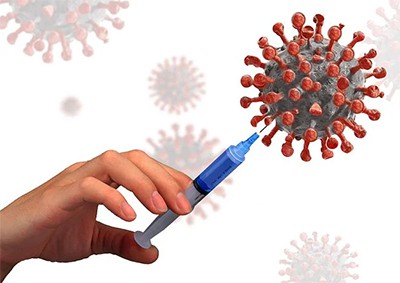COVID-19 Vaccine
Multiple vaccines being developed
| Download this episode | There are currently multiple vaccines under development throughout the world to combat the COVID-19 virus. As of last month, five such vaccines were in Phase 3 trials, used to assess any potential side effects of the drugs before they are approved for public use and released to the general public. This multiple approach toward a preventive measure is not uncommon. Researchers began working on developing vaccines for severe acute respiratory syndrome, or SARS, and Middle East respiratory syndrome, better known as MERS, after they were discovered in 2003 and 2012, respectively. None of the SARS vaccines ever made it past the first stages of development and testing, in large part due to lack of interest because the virus disappeared. One MERS vaccine successfully completed a Phase 1 clinical trial in 2019. Lessons learned from this earlier research have been used to inform strategies for developing a COVID-19 vaccine. | The goal of a vaccine against COVID-19 is to get as many Americans vaccinated as soon as it is approved by the U.S. Food and Drug Administration. A limited supply is expected to be available in the U.S. this month, but the supply will continually increase in the months that follow. Healthcare personnel and long-term care facility residents should be offered COVID-19 vaccination in the initial phase of the U.S. program. By providing critical care to those infected with the virus that causes COVID-19, many health care personnel have a high risk of getting sick. Health care personnel who get COVID-19 can also spread the virus to patients seeking care for medical conditions that, in turn, increase their patients’ risk for severe COVID-19 illness. Early vaccine access is critical to ensuring the safety of this essential workforce of approximately 21 million people, protecting not only them but also their communities and the broader health of our country. | Why should you be vaccinated against COVID-19? COVID-19 can have serious, life-threatening complications, and there is no way to know how it will affect you. And if you get sick, you could spread the disease to friends, family, and others around you. Clinical trials of COVID-19 vaccines must first show that they are safe and effective before any vaccine can be authorized or approved for use. The known and potential benefits of a vaccine must outweigh the known and potential risks of the vaccine for use under what is known as an Emergency Use Authorization. Getting COVID-19 may offer some natural protection, known as immunity. But experts don’t know how long this protection lasts, and the risk of severe illness and death from COVID-19 far outweighs any benefits of natural immunity. Once approved for use, a COVID-19 vaccination will help protect you by creating an antibody response without having to experience sickness. | How long will the COVID-19 vaccine protect you? It’s unknown how long the vaccine, once approved and in general use, will protect patients from the virus. Dr. Robert Hopkins of UAMS’ Department of Internal Medicine says patients who have participated in the trials of COVID-19 vaccines will continue to be monitored for at least two years after they received their vaccine to help answer this question. There is additional research being done to develop more tools to help answer this and other questions about long term protection from COVID-19. Dr. Hopkins says none of the vaccines currently in development contain a live coronavirus or enough material from a coronavirus to put anyone who receives the vaccine at risk for getting the disease. Based on what is known about vaccines for other diseases, experts believe that getting a COVID-19 vaccine may help keep you from getting seriously ill even if you do get the disease. | Many have questioned the need for the development of multiple COVID-19 vaccines once one is seen as being effective in preventing the virus. Part of the reason is because hundreds of millions of Americans as well as billions worldwide need to be vaccinated, and it remains unknown which vaccine works best for which population. Luckily, the vaccine will be available at no cost to any American, regardless of their insurance status, at local hospitals and health departments once it is approved. Until then, and even afterwards, everyone is urged to maintain a distance of at least six feet from other individuals in public places. And whether you’ve been vaccinated or not, or whether you have any symptoms of COVID-19, continue to practice safety measures like wearing a mask when around others outside of your household and to sanitize your hands regularly. You can never be too safe when it comes to dealing with this disease.
Transcript
Supply will continue to grow
Transcript
Why get vaccinated?
Transcript
Will continue to be monitored
Transcript
Why multiple vaccines?
Transcript
